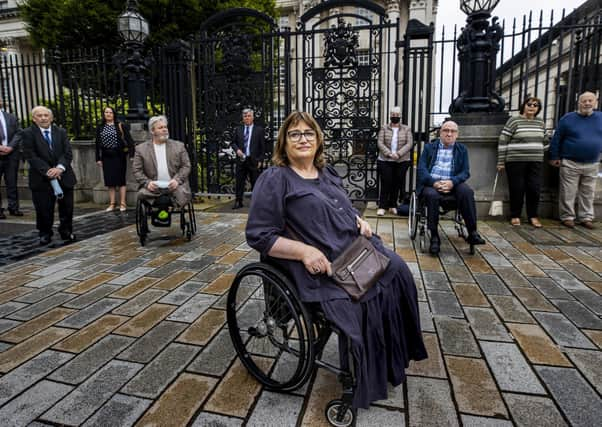Victims’ pension scheme dispute settled as Stormont agrees to pay


As part of the undertaking, the Department of Finance will make the necessary funding available to ensure eligible victims and survivors receive compensation.
The confirmation brings an end to a long-running legal battle about who should cover the potential cost of up to £1.2bn.
Advertisement
Hide AdAdvertisement
Hide AdWith Stormont and Westminster locked in a dispute over responsibility, Northern Ireland’s most senior judge had issued an ultimatum for the Executive Office to either agree to fund the scheme or be ordered to act.
In court yesterday it was confirmed that the necessary assurances have now been given.
A letter sent on behalf of the Executive Office stated: “The First Minister, Deputy First Minister, the Justice Minister and Finance Minister, being mindful that the victims and survivors who will be recipients of the payment should not be distressed or concerned, acknowledge that the payment is an entitlement as indicated by the court, and regardless of whether it comes from Westminster or from our block grant, it will be paid when it is due.”
The correspondence set out a series of interlinked pledges.
First Minister Arlene Foster, Deputy First Minister Michelle O’Neill and Finance Minister Conor Murphy “undertake on behalf of their respective departments that payments will be made to successful applicants”.
Advertisement
Hide AdAdvertisement
Hide AdWhen the Department of Justice requests funding, the Executive Office is to be provided with the required money by the Department of Finance “without delay”.
“The Executive Office will then, on receipt of such funding, make the necessary grants to the Department of Justice in response to its requests for funding,” the letter stated.
It added: “Ministers will continue to progress financial discussions with the Northern Ireland Office on the basis that it remains their shared view that the scheme should be funded by the Westminster government as an addition to the block grant, and in a manner consistent with the Statement of Funding Policy.”
Lord Chief Justice Sir Declan Morgan agreed that a “satisfactory” undertaking has now been received.
Advertisement
Hide AdAdvertisement
Hide AdThe development concluded a legal action mounted by one of the so-called Hooded Men.
Brian Turley’s challenge had continued since the High Court ruled in August last year that the Executive Office deliberately stymied introduction of the scheme in a bid to force the UK government into footing the bill.
Mr Turley took the original challenge to delays in implementing the pension scheme along with Jennifier McNern, who lost both legs in an IRA bomb attack in Belfast in 1972.
Outside court his solicitor, Darragh Mackin, said: “After years of suffering, it is hoped that this small step can now ensure that those victims will receive the necessary redress and financial assistance they so greatly deserve.”